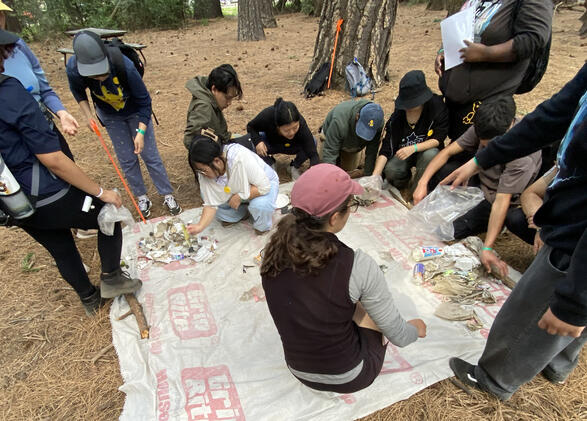The Top 5 Benefits of Nature

For decades, doctors and researchers have studied the impact of spending time in nature. And year after year they continue to find that the rewards of even just a few moments outdoors can lead to happier, healthier and more productive lives. If you're ready to incorporate the benefits of time in nature into your students' learning, start planning your trip to NatureBridge today!
At NatureBridge, we see these benefits every day in the more than 31,000 kids that we serve. Based on research and backed by our students, teachers and educators who are in the field every day, here are the top five benefits of exposure to nature:
1. Reduces Stress #
Gurgling streams, serene meadows and remote mountaintops are commonly used to evoke a sense of calm. Research shows that beyond just beautiful images, these environments can reduce stress, lower blood pressure and increase mood and self-esteem.
Last spring, Outside Magazine published an article titled, “Science's Newest Miracle Drug Is Free.” The article, written by Aaron Reuben, highlights a growing movement among doctors: Doing away with prescription medications and instead prescribing time in nature, a practice being called Park Rx. When kids have the opportunity to run, skip, jump and be outdoors, they often become more relaxed, let go of anxieties and feel more at ease—all of which benefit overall health.
Now as I sit here and write on this perfect rock, I’ve felt a peace I haven’t felt in a while. The same peace I saw when I saw the moon so close I thought I could touch it. With the sun warming my body and my feet up on this rock I feel complete. Maybe nature is for me after all.Fatima, Yosemite, student
2. Improves Concentration #
Nature has long been sought as a means to boost cognitive functioning. Similar to reducing stress, time in the outdoors has been shown to rejuvenate and restore the mind. Green, natural environments can stimulate curiosity and engagement.
This includes attention deficit disorder and its symptoms among children, which can be improved through time spent engaging in outdoor activity, according to Urban Greening Research conducted by the University of Washington’s College of the Environment.

3. Enhances Learning #
If nature can reduce stress and anxiety and improve concentration, it’s expected that it can enhance a child’s ability to learn as well. Numerous studies have connected more recess time with improved test scores. In a recent Greater Good Magazine article published by the Greater Good Science Center at UC Berkeley, Ming Kuo writes that there are a surprising number of ways that nature improves learning.
Citing several studies, she writes that outdoor learning environments and classrooms with views of trees or the outdoors improve academics. In one study, not only were standardized test scores higher among students more connected to nature, the study found that enthusiasm about class was stronger as well. In addition to improving test scores, nature has been shown to provide self-discipline and increased engagement among students.
Everybody should have the experience of learning through the lens of a nature adventure. Students were engaged in productive talk, experimenting, and curiosity. It's amazing how much learning takes place when students are immersed in the actual environment. Computers, pictures, and virtual learning rooms can't replicate this experience. It is awesome!Tondra Odom, Prince William, teacher
4. Cultivates Joy #
The outdoors have been found to reduce symptoms of anxiety and depression, as well as provide many therapeutic benefits, according to Harvard Men’s Health Watch of Harvard Health Publishing. At the most basic level, time to run through grass, play in the dirt and dig for worms is one of the simplest joys of childhood. At NatureBridge, we believe that opportunity to experience awe in the outdoors is foundational.

In the short span of three days, the students were introduced to a whole different lifestyle. Our students hiked, learned about environmental justice and food insecurity; all the while, connecting to nature and each other. The students found sanctuary in the Santa Monica Mountains, away from the congestion of city life in South LA.Araceli Campos, Santa Monica Mountains, teacher
5. Fosters Stewardship #
In order to take care of something, one must first feel a connection. At NatureBridge, we believe creating new leaders and stewards begins when students discover their own interest and passion for the environment.
Dr. Nicole Ardoin of Stanford University Graduate School of Education conducted a 2017 examination of more than 100 peer-reviewed studies analyzing the impacts of environmental education. The review found that 83% of the studies analyzed reported at least some level of positive findings in regard to environmental stewardship as a result of environmental education.
NatureBridge created in me a passion to care for the environment. I am motivated to educate others, like my little brothers, on the importance of being eco-friendly. It has also produced a strong desire for a better tomorrow that I can help to create.Joshua, Golden Gate, student
Environmental education programs provide the opportunity to connect with nature. By connecting kids to our greatest classrooms—national parks—we’re empowering the next generation to understand, celebrate and protect the natural world.

